Filter by

Viability of UNCLOS amid Emerging Global Maritime Challenges
This open access book assesses UNCLOS' resilience and vitality as a legal framework for addressing emerging global maritime challenges. Against the backdrop of a number of emerging global maritime challenges, including the rise of sea levels and the maintenance of maritime safety and connectivity, the preservation of marine biodiversity of areas beyond national jurisdiction, and the promotion o…
- Edition
- -
- ISBN/ISSN
- 9789819758388
- Collation
- XVI, 201 hlm; ill., lamp.,
- Series Title
- -
- Call Number
- -

The Nexus Between Legal Pluralism and Inclusive Finance = Insights from Ethio…
This open access book provides detailed information on informal credit markets in Africa and how various legal systems affect these markets. Laws that impose strict formalism exclude many people from the financial system. The lessons learned from the informal credit markets in Ethiopia and South Africa indicate that pluralism offers better opportunities for people to access affordable and susta…
- Edition
- -
- ISBN/ISSN
- 9783031716539
- Collation
- VII, 160 hlm; ill., lamp.,
- Series Title
- -
- Call Number
- -
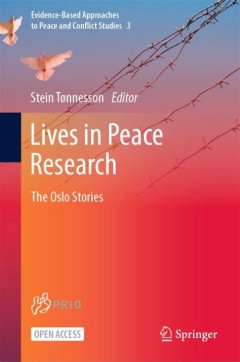
Lives in Peace Research = The Oslo Stories
This open access book explains how PRIO, the world’s oldest peace research institute, was founded and how it survived through crises. In this book, twenty-four of its researchers and associates, including Johan Galtung, Ingrid Eide, and Mari Holmboe Ruge, who founded the institute back in 1959, tell the stories of their roles in inventing and developing peace research. They reflect on their p…
- Edition
- 1
- ISBN/ISSN
- 9789811647178
- Collation
- XX, 508 ill; lamp
- Series Title
- 3
- Call Number
- -
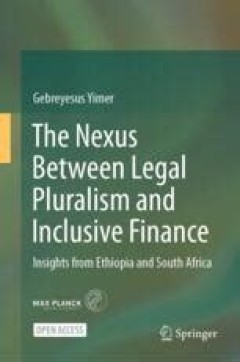
The Nexus Between Legal Pluralism and Inclusive Finance = Insights from Ethio…
This open access book provides detailed information on informal credit markets in Africa and how various legal systems affect these markets. Laws that impose strict formalism exclude many people from the financial system. The lessons learned from the informal credit markets in Ethiopia and South Africa indicate that pluralism offers better opportunities for people to access affordable and susta…
- Edition
- 1
- ISBN/ISSN
- 9783031716539
- Collation
- VII, 160 hlm; ill., lamp.,
- Series Title
- -
- Call Number
- -

Stakeholder Relationships And Sustainability = The Case Of Health Aid To The …
This open-access book analyses how stakeholder relationships impact the sustainability of health aid. It does this by providing an overarching analytical framework, which allows for a systematic analysis of sustainability, relationships, and a possible causal link between these phenomena. The book goes beyond universal paradigms and detailed single-case studies by offering a thorough analysis o…
- Edition
- 1
- ISBN/ISSN
- 9783031319907
- Collation
- XXV, 381 ill; lamp
- Series Title
- -
- Call Number
- -
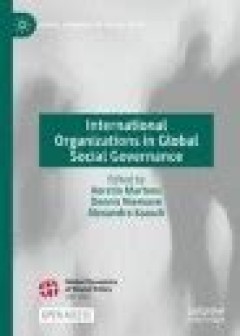
International Organizations in Global Social Governance
International Organizations (IOs) are important actors within global social governance. They provide forums for exchange, contention and cooperation about social policies. Our knowledge about the involvement of IOs varies significantly by policy fields, and we know comparatively little about the specific roles of IOs in social policies. This volume enhances and systematizes our understanding…
- Edition
- 1
- ISBN/ISSN
- 9783030654399
- Collation
- XXVII, 353 ill; lamp
- Series Title
- -
- Call Number
- -

Conservation of Contemporary Art : Bridging the Gap Between Theory and Practice
This open access book investigates whether and how theoretical findings and insights in contemporary art conservation can be translated into the daily work practices of conservators or, vice versa, whether and how the problems and dilemmas encountered in conservation practice can inform broader research questions and projects. For several decades now, the conservation of contemporary art has be…
- Edition
- 1
- ISBN/ISSN
- 9783031423574
- Collation
- VIII, 401 hlm,: ill, lamp;
- Series Title
- 9
- Call Number
- -
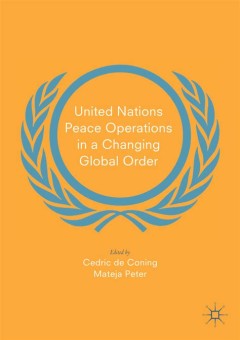
United Nations Peace Operations in a Changing Global Order
This open access book explores how UN peace operations are adapting to four transformational trends in the changing global order: (1) the rebalancing of relations between states of the global North and the global South; (2) the rise of regional organisations as providers of peace; (3) the rise of violent extremism and fundamentalist non-state actors; and (4) increasing demands from non-state ac…
- Edition
- -
- ISBN/ISSN
- 9783319991061
- Collation
- XXV, 334hlm; ill., lamp.,
- Series Title
- -
- Call Number
- -
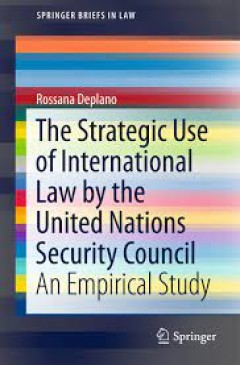
The Strategic Use of International Law by the United Nations Security Council…
The book offers insights on whether international law can shape the politics of the Security Council and conversely, the extent to which the latter contribute to the development of international law. By providing a systematic analysis of the quantity and quality of international legal instruments referred to in the text of resolutions, the book reconstructs patterns of the Security Council’s …
- Edition
- -
- ISBN/ISSN
- 978-3-319-21281-4
- Collation
- -
- Series Title
- -
- Call Number
- -

The Shipping Industry, Ocean Governance and Environmental Law in the Paradigm…
This book examines the corpus of status quo environmental legal regime, geographical issues and redundant “stakeholder claims,” which persist in the Arctic. It examines multifarious theories relating not only to conflicting and opposing interests, but also to parties to whom the shipping industry should be accountable. The unique aspect of this book is the Corporate Social responsibility an…
- Edition
- -
- ISBN/ISSN
- 978-3-319-12541-1
- Collation
- -
- Series Title
- -
- Call Number
- -
 Computer Science, Information & General Works
Computer Science, Information & General Works  Philosophy & Psychology
Philosophy & Psychology  Religion
Religion  Social Sciences
Social Sciences  Language
Language  Pure Science
Pure Science  Applied Sciences
Applied Sciences  Art & Recreation
Art & Recreation  Literature
Literature  History & Geography
History & Geography